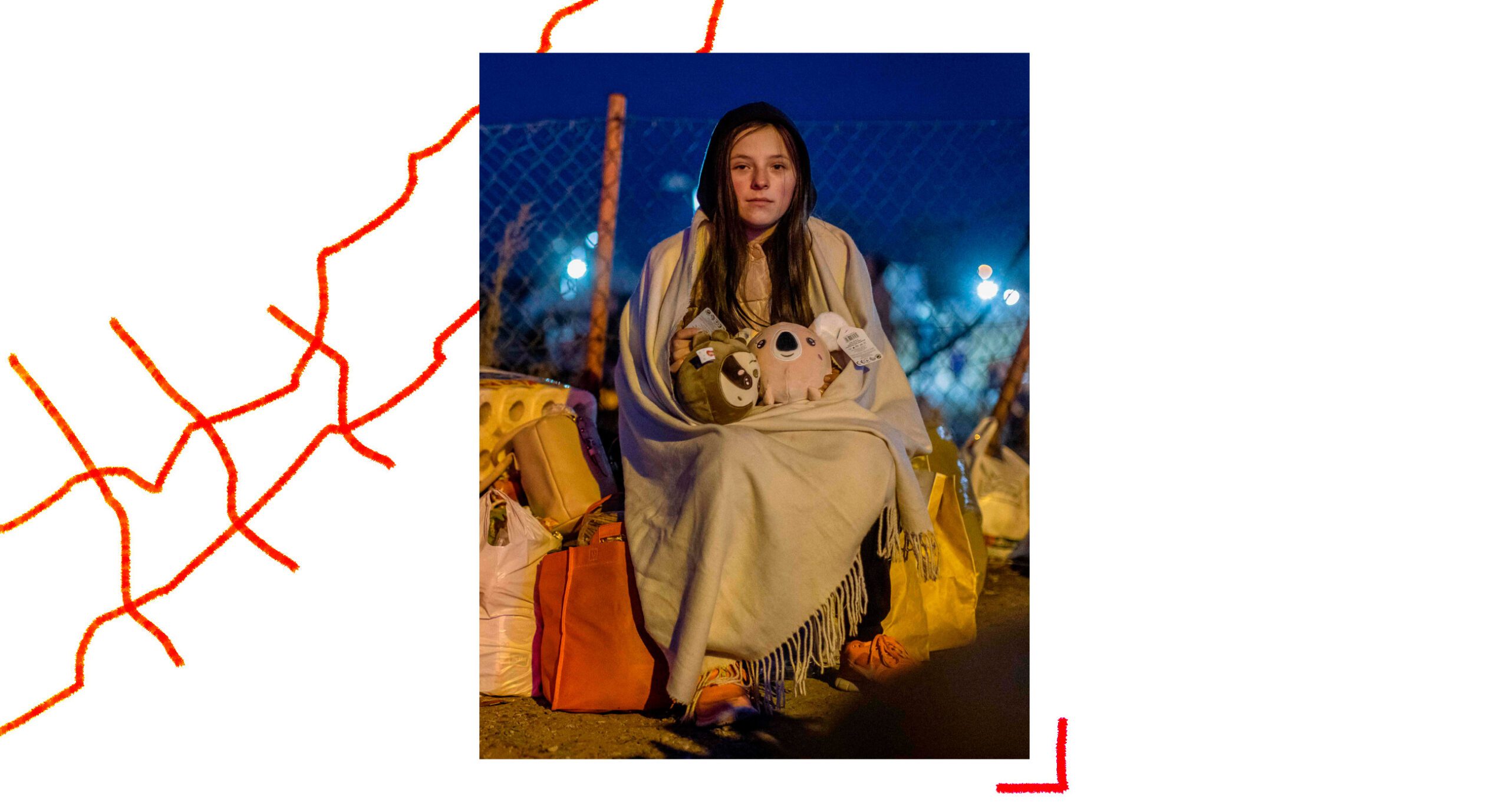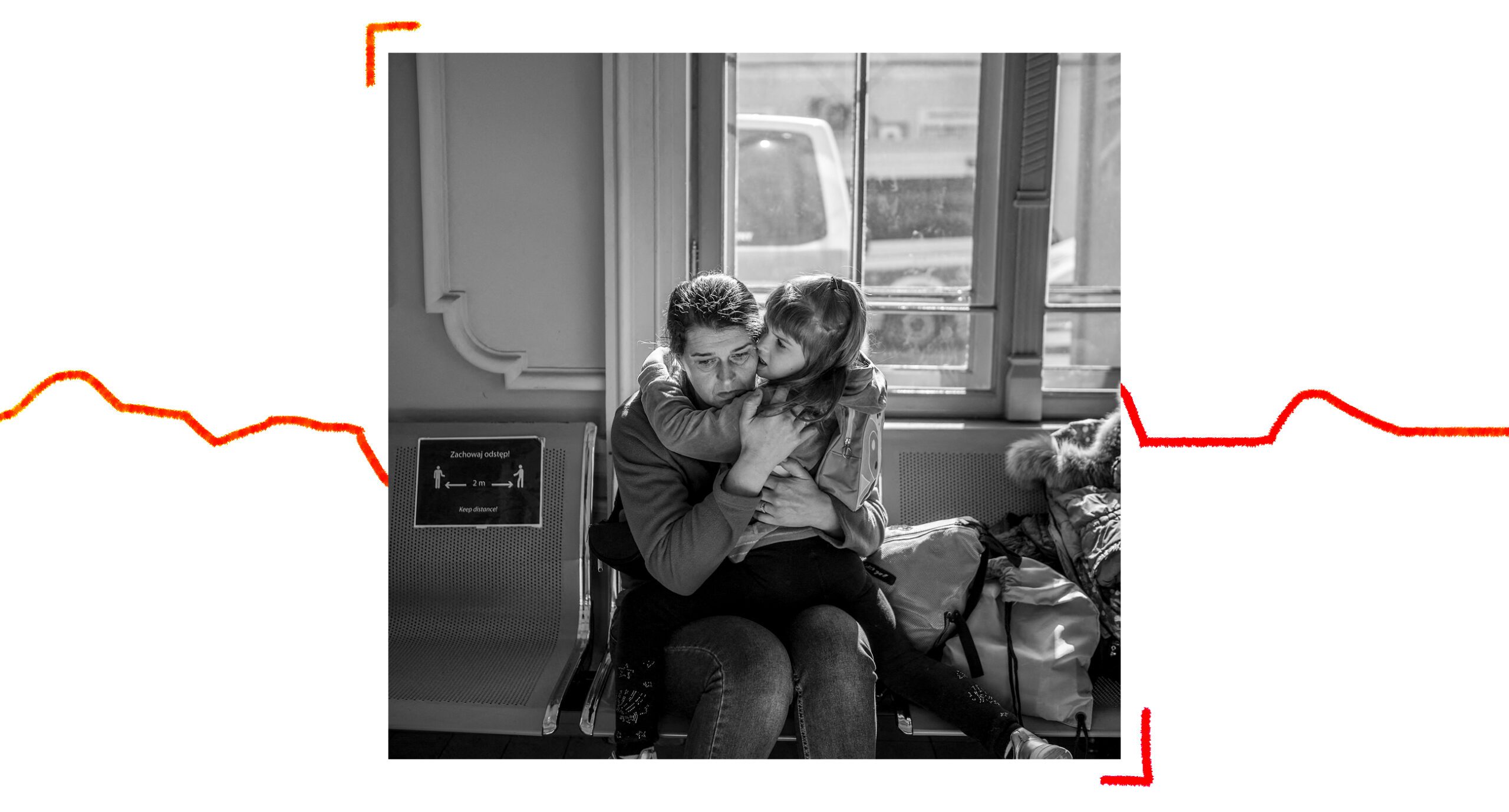With the beginning of the Russian invasion, Poland hosted the largest number of refugees from Ukraine. Some of them need emergency contraception or abortion: women suffer from sexual violence by Russian soldiers or fall into the hands of local criminals. It is almost impossible to get such pills in Poland, and up to three years in prison are provided for assistance with an abortion. However, many activists are still developing an “abortion underground” to help Ukrainian women. Zaborona journalist Nastya Podorozhnya has been living in Poland for several years. With the start of the Russian invasion, she set up the Martynka hotline for the Safety of Refugees from Ukraine and now tells who to contact when semi-legal pills are needed, how safe it is to spend the night with strangers in Poland, and whether activists are afraid of going to jail for helping Ukrainian women.
“I was raped in Ukraine, I’m in Poland now, and I need help.” “I’m depressed — I can’t get out of bed after fleeing the war.” “Emergency contraception is needed, and the waiting list at the Polish hospital is two weeks. I don’t want to be pregnant in a foreign country during the war, what should I do?” I received these messages from people who have been forced to leave Ukraine in the last month. They write on Telegram and Instagram to Martynka special hotline, which we created together with volunteers to make women feel safe in Poland.
It is for security reasons that more than 2.3 million people have come here since the beginning of Russia’s full-scale invasion of Ukraine. According to the United Nations High Commissioner for Refugees (UNHCR), most of those arriving in Poland stay here and do not go to other countries.
This happened to my family as well. Part of the family that lived in Kyiv before the war has now moved to Krakow. They see how Poland is helping refugees. Everyone lives in an apartment shared by acquaintances, clothes and toys for my nieces were collected by volunteers, and I even got Wi-Fi for my relatives for free — at a special rate for Ukrainians from a local company. I am endlessly touched by this kindness — I have probably never said the word “thank you” as often as in the last month and a half.
But refugees get not only help, but also something else. Last month, a 19-year-old Ukrainian woman turned to Wroclaw police. The girl, who fled the war, said she was offered shelter by a 49-year-old local man but later raped. Police and prosecutors gathered evidence, conducted a medical examination and interrogation, and then announced the suspicion of the man. A week later, the court ruled that there was no violence against the girl because she did not actively resist. The judge changed the rape charge to “sexual exploitation in a dependent situation.” This is a much easier crime in terms of punishment: for rape convict is given a maximum of twelve years in prison, for “sexual exploitation” — three years.
Weak side
The Polish law enforcement and judicial system is sluggish in dealing with cases of sexualized violence. I know this from my own experience: 4 years ago, a man tried to rape me right on the streets of Krakow. He forcibly knocked me to the ground, closed my mouth with his hand and was about to undress me, but then came to his senses and ran away. I found the offender in hot pursuit, along with the police – his cheek was bleeding from my scratches. The police immediately released the man: they said that there was no crime as such, because the man did not rape me. On the way home, law enforcement officers rejected the idea of suing the offender because it would “exhaust” me, and joked that both he and I had Ukrainian passports, saying that the man had “found a brotherly soul.”
Back in 2015, according to STER Foundation statistics, 55% of rapes in Poland took place at home, where we usually feel safe. Polish activist and author of the book Polish Violence Maja Stasko says that criminals now use the trust of refugee women to overstep their personal boundaries: “Because of this, many women do not want to talk about rape in the police. They are ready to believe in their own guilt rather than in the guilt of the person who was supposed to help them and give them shelter.”
Criminals who want to exploit refugees are even coming for this purpose to Poland and other Central European countries. I learned about this from Thomas Osten-Sacken, director of WADI — The German Crisis Relief Association. Speaking of the mass evacuation of Ukrainian women, he used a metaphor that shocked me: “it’s Christmas, Easter and the birthday at the same time for all sorts of bastards.” According to another WADI employee Shirin Tinnesand who is in charge of refugee and migration affairs, on the dark web, even before the start of the Russian invasion, criminals were spreading instructions on how to lure Ukrainian women and manipulate them in the event of war.

Ukrainian refugee on the border with Poland, February 26, 2022. Photo: WOJTEK RADWANSKI/AFP via Getty Images
The idea of a hotline for Ukrainian refugees was born the same evening I talked to Thomas and Shirin. I wanted to create a “friend” who you could write to, for example, if you are fleeing the war alone and want to be in touch with someone. This is not a whim, but a basic safety rule — if something happens to you, someone should notice it quickly. The Martynka hotline works in Telegram — it is a chatbot operated by real people. We share safety tips for when a Ukrainian woman is given a ride or offered an overnight stay by a stranger. We save the photo of the the cars’ license plates so that in case something happens the data remains in the bot. We simply support morally a person in need.
I learned from my own experience how difficult it is to tell the police about what happened to you in a foreign language. That’s why Martynka immediately announced that our volunteers are ready to go to the police station with the victim of the crime. There we are ready to translate her statements into Polish or simply give moral support to a person who needs it.
In a couple of weeks, around the time the world saw footage from Bucha, Borodyanka, and other towns liberated from the Russian occupiers, Martynka began to increasingly answer refugees’ questions about whether emergency contraception or abortion could be provided in Poland.
Abortion wave
Poland has one of the strictest anti-abortion laws in Europe (read more detailed account in Zaborona’s article). Abortions are allowed only in two cases: if the pregnancy threatens the life of the mother or if there is reason to believe that the conception was rape-related. In fact, even the threat to the mother’s life does not always allow terminating the pregnancy. Doctors are afraid to take responsibility for such a decision, because they can get real terms in prison. For example, a Polish woman Isabella who did not have a timely abortion in a hospital has already died: the fluid-filled sac had ruptured, the child died inside the mother, and the woman suffered from septic shock.
Even if it is known that a child will die immediately after birth, it still must be carried, because pathology is not a legal reason for abortion. Polish women who want to terminate a pregnancy for any reason are forced to look for ways to do so in other countries, or ask for help from volunteer organizations. Last year, Zaborona wrote about organizations that help Polish women terminate their pregnancies in Germany, the Czech Republic, Austria and other countries neighboring Poland. In personal conversations with me, representatives of organizations that help with abortions abroad, said that over the past month they have received more applications for help from Ukrainian and Russian speakers.
But in order to terminate a pregnancy in Poland, it is not necessary to go abroad. There are organizations that send a pill for pharmacological abortion after a short consultation. It is safe to undergo the procedure with a proven organization, according to the WHO. This includes the method of “safe abortion” when you receive pills online through a service such as Women On Web, which provides additional information and support. Women On Web has been operating worldwide since 2005. Recently, Women On Web became partners of Martynka — together we will tell women who write to the hotline how to get the right pill safely and free of charge, and whether a woman has any contraindications.
Underground
About 20 Russian- and Ukrainian-speaking women have applied to the Polish branch of Women On Web in the last month. On April 13, it turned out that at least 54 people with unwanted pregnancies who had fled to Poland from the war had turned to another large organization Women Help Women.
We are all in the underground now. In Poland, you can legally terminate a pregnancy only for yourself — for example, buy and drink a pill. Helping someone having an abortion — for example, giving money or sharing the stashed pill is a crime under Polish law. At the same time, there is a nuance: “In order for the organization to bear criminal liability, it would be necessary to prove that assistance was provided to a specific acquaintance. Posting information on the Internet or consulting on an anonymous hotline do not fall under the article,” lawyer Karolina Buchko explains to Zaborona.
A volunteer can go to jail for “assisting abortions” only upon the report of a witness who will tell from who and to whom the pill was given. Recently, the first such report appeared in the police. Anya, a Polish woman, was in an abusive relationship: her partner forbade her to have an abortion and threatened her. Yustina, an Abortion Dream Team volunteer, handed Anya the pill she had. Anya’s partner found out about it and went to the police. Yustina’s criminal case is the first time in Europe that an abortion activist has been tried for helping another woman. Yustina faces up to 3 years in prison, the first court hearing took place last week.
“When I saw a sticker with a QR code for this chatbot in the toilet at the station, for the first time in my life I decided to use it,” a girl who survived violence in Poland wrote to me recently. When I put up Martynka stickers in toilets and at train stations, I feel a little nervous, like before an exam. Maybe the police will notice this sticker, maybe they will be interested in the phrase “we will give pills when needed”. Maybe I’ll stand trial and face imprisonment, like the Poles who have already received real terms for “assistance with an abortion.”
But for the most part, I feel anger, not fear: why, when so many Ukrainian women need help in Poland, do I have to spend my energy thinking on the reason for writing the word “abortion” directly on the Martynka stickers?
“Say things you haven’t told anyone yet”
The most popular request that Martynka is now receiving is not abortion or safety consultations, but psychological help. Those who have been abused and those who, for example, are afraid to take to the streets after the bombing are asking. Some talk about children’s issues: they cry, moan or gnash their teeth in their sleep. Someone needs to talk about adapting to a new place. “I suppressed all my emotions while fleeing,” wrote a person who ended up in a Western European country.

Ukrainian refugee with a child at the railway station in Przemyśl, March 22, 2022. Photo: ANGELOS TZORTZINIS/AFP via Getty Images
The language of consultation with a psychologist depends on the wishes of those who contact us. “Despite the fact that I am basically switching to Ukrainian, Russian is still more common, and this is important in therapy,” wrote one of the women who asked for a Russian-language consultation. We are also ready for a situation if an English-speaking person comes to the line, because people of different origins are fleeing Ukraine.
We try to organize psychological assistance to victims of sexual violence face to face with a specialist. “We need to create a safe space and an atmosphere of trust in which people can say things they might not say to anyone. This is difficult in personal meetings, but even more difficult when a person sees a flat image in front of him. In addition, some techniques for working with victims of violence use physical practices that are simply impossible to conduct online,” explains Olena Platova, a psychologist who advised Martynka on helping victims of sexual violence. If it is not possible to go to face-to-face meetings, you should not give up online sessions, Platova insists: “At a distance, a person will still gain experience working with her emotional and physical states, and it will bring relief.” If you can’t find a psychologist offline, we usually offer specialists who are ready to talk on video call.
The psychologists in Martynka are mostly Ukrainian women who were forced to flee the war to Poland. This was my idea from the very beginning: to give volunteering opportunity for people who have gone abroad and would like to use their skills for Ukraine. At the same time, specialists among Ukrainian and Belarusian emigrants living in Poland cooperate with Martynka. Our hotline is constantly in need of volunteer psychologists.
For me, the most difficult category of people who turn to Martynka are those who ask for help and then stop answering. Once a girl wrote that she was raped in Ukraine, and she is looking for a psychologist in Poland — I found options in response, but for two weeks I have not received feedback from her. Such people do not come out of my head, I continue to write them short messages every few days. I write that a person can return to the conversation when she is ready, and that I will stay by her side anyway.
“Violence is like a time bomb,” says psychologist Olena Platova. “A person can first cope with the trauma if she has a sufficiently empathetic, warm, wise environment, and if she slowly gets out of bed and starts doing something. However, retraumatizations are always possible — for example, from a careless rude word or a scene seen. Therefore, it is still better when people get help from a specialist and heal wounds. But a person can feel relief from the fact that she wrote to the hotline and spoke out, and much later work with a specialist. It is good just to stay in touch with a person who has experienced violence and tell them/her that you are by their/her side. When a victim reads such messages, she realizes that she is accepted with her trauma. This already has a therapeutic effect. In general, not only a specialist helps. It is also the environment, and the opportunity to do something active, to gain new emotional experience — the whole world can work as a psychologist for a person who has experienced trauma”.







